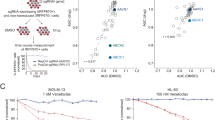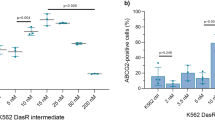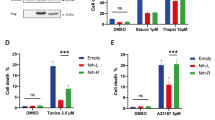Abstract
The breast cancer resistance protein, also known as ABCG2, is one of the most highly studied ATP-binding cassette (ABC) transporters because of its ability to confer multidrug resistance1,2. The lack of information on the physiological role of ABCG2 in humans severely limits cancer chemotherapeutic approaches targeting this transporter. We report here that ABCG2 comprises the molecular basis of a new blood group system (Junior, Jr) and that individuals of the Jr(a−) blood type have inherited two null alleles of ABCG2. We identified five frameshift and three nonsense mutations in ABCG2. We also show that the prevalence of the Jr(a−) blood type in the Japanese and European Gypsy populations is related to the p.Gln126* and p.Arg236* protein alterations, respectively. The identification of ABCG2−/− (Jr(a−)) individuals who appear phenotypically normal is an essential step toward targeting ABCG2 in cancer and also in understanding the physiological and pharmacological roles of this promiscuous transporter in humans.
This is a preview of subscription content, access via your institution
Access options
Subscribe to this journal
Receive 12 print issues and online access
$209.00 per year
only $17.42 per issue
Buy this article
- Purchase on Springer Link
- Instant access to full article PDF
Prices may be subject to local taxes which are calculated during checkout


Similar content being viewed by others
References
Polgar, O., Robey, R.W. & Bates, S.E. ABCG2: structure, function and role in drug response. Expert Opin. Drug Metab. Toxicol. 4, 1–15 (2008).
Noguchi, K., Katayama, K., Mitsuhashi, J. & Sugimoto, Y. Functions of the breast cancer resistance protein (BCRP/ABCG2) in chemotherapy. Adv. Drug Deliv. Rev. 61, 26–33 (2009).
Helias, V. et al. The human porphyrin transporter ABCB6 is dispensable for erythropoiesis but responsible for the new blood group system Langereis. Nat. Genet. published online, doi:10.1038/mg.1069 (15 January 2012).
Kwon, M.Y., Su, L., Arndt, P.A., Garratty, G. & Blackall, D.P. Clinical significance of anti-Jra: report of two cases and review of the literature. Transfusion 44, 197–201 (2004).
Peyrard, T. et al. Fatal hemolytic disease of the fetus and newborn associated with anti-Jr. Transfusion 48, 1906–1911 (2008).
Nakajima, H. & Ito, K. An example of anti-Jra causing hemolytic disease of the newborn and frequency of Jra antigen in the Japanese population. Vox Sang. 35, 265–267 (1978).
Miyazaki, T. et al. A human monoclonal antibody to high-frequency red cell antigen Jra. Vox Sang. 66, 51–54 (1994).
Pisacka, M. et al. Six cases of anti-Jra antibody detected in one year—a probable relation with Gypsy ethnic minority from central Slovakia. Proceedings of the 26th Congress of the International Society for Blood Transfusion Vol. 78, 146 (Vienna, 2000).
Scharenberg, C.W., Harkey, M.A. & Torok-Storb, B. The ABCG2 transporter is an efficient Hoechst 33342 efflux pump and is preferentially expressed by immature human hematopoietic progenitors. Blood 99, 507–512 (2002).
Allikmets, R., Schriml, L.M., Hutchinson, A., Romano-Spica, V. & Dean, M. A human placenta-specific ATP-binding cassette gene (ABCP) on chromosome 4q22 that is involved in multidrug resistance. Cancer Res. 58, 5337–5339 (1998).
Doyle, L.A. et al. A multidrug resistance transporter from human MCF-7 breast cancer cells. Proc. Natl. Acad. Sci. USA 95, 15665–15670 (1998).
Miyake, K. et al. Molecular cloning of cDNAs which are highly overexpressed in mitoxantrone-resistant cells: demonstration of homology to ABC transport genes. Cancer Res. 59, 8–13 (1999).
Vlaming, M.L., Lagas, J.S. & Schinkel, A.H. Physiological and pharmacological roles of ABCG2 (BCRP): recent findings in Abcg2 knockout mice. Adv. Drug Deliv. Rev. 61, 14–25 (2009).
Maliepaard, M. et al. Subcellular localization and distribution of the breast cancer resistance protein transporter in normal human tissues. Cancer Res. 61, 3458–3464 (2001).
Huls, M. et al. The breast cancer resistance protein transporter ABCG2 is expressed in the human kidney proximal tubule apical membrane. Kidney Int. 73, 220–225 (2008).
Zhou, S. et al. Increased expression of the Abcg2 transporter during erythroid maturation plays a role in decreasing cellular protoporphyrin IX levels. Blood 105, 2571–2576 (2005).
Cusatis, G. & Sparreboom, A. Pharmacogenomic importance of ABCG2. Pharmacogenomics 9, 1005–1009 (2008).
Imai, Y. et al. C421A polymorphism in the human breast cancer resistance protein gene is associated with low expression of Q141K protein and low-level drug resistance. Mol. Cancer Ther. 1, 611–616 (2002).
Lee, S.S. et al. Identification and functional assessment of BCRP polymorphisms in a Korean population. Drug Metab. Dispos. 35, 623–632 (2007).
Kobayashi, D. et al. Functional assessment of ABCG2 (BCRP) gene polymorphisms to protein expression in human placenta. Drug Metab. Dispos. 33, 94–101 (2005).
Tamura, A. et al. Re-evaluation and functional classification of non-synonymous single nucleotide polymorphisms of the human ATP-binding cassette transporter ABCG2. Cancer Sci. 98, 231–239 (2007).
Dehghan, A. et al. Association of three genetic loci with uric acid concentration and risk of gout: a genome-wide association study. Lancet 372, 1953–1961 (2008).
Kolz, M. et al. Meta-analysis of 28,141 individuals identifies common variants within five new loci that influence uric acid concentrations. PLoS Genet. 5, e1000504 (2009).
Woodward, O.M. et al. Identification of a urate transporter, ABCG2, with a common functional polymorphism causing gout. Proc. Natl. Acad. Sci. USA 106, 10338–10342 (2009).
Matsuo, H. et al. Common defects of ABCG2, a high-capacity urate exporter, cause gout: a function-based genetic analysis in a Japanese population. Sci. Transl. Med. 1, 5ra11 (2009).
Jonker, J.W. et al. The breast cancer resistance protein protects against a major chlorophyll-derived dietary phototoxin and protoporphyria. Proc. Natl. Acad. Sci. USA 99, 15649–15654 (2002).
Puy, H., Gouya, L. & Deybach, J.C. Porphyrias. Lancet 375, 924–937 (2010).
Itoda, M. et al. Eight novel single nucleotide polymorphisms in ABCG2/BCRP in Japanese cancer patients administered irinotacan. Drug Metab. Pharmacokinet. 18, 212–217 (2003).
Bäckstrom, G. et al. Genetic variation in the ATP-binding cassette transporter gene ABCG2 (BCRP) in a Swedish population. Eur. J. Pharm. Sci. 18, 359–364 (2003).
Ballif, B.A., Carey, G.R., Sunyaev, S.R. & Gygi, S.P. Large-scale identification and evolution indexing of tyrosine phosphorylation sites from murine brain. J. Proteome Res. 7, 311–318 (2008).
Elias, J.E. & Gygi, S.P. Target-decoy search strategy for increased confidence in large-scale protein identifications by mass spectrometry. Nat. Methods 4, 207–214 (2007).
Arnaud, L. et al. Identification and characterization of a novel XK splice site mutation in a patient with McLeod syndrome. Transfusion 49, 479–484 (2009).
Gouya, L. et al. Contribution of a common single-nucleotide polymorphism to the genetic predisposition for erythropoietic protoporphyria. Am. J. Hum. Genet. 78, 2–14 (2006).
Acknowledgements
The authors are indebted to all present and past members of the CNRGS for identifying and conserving Jr(a−) blood samples and extracting genomic DNA. We greatly appreciate M. Le Gall for her thoughtful comments on the manuscript. This study was supported in part by the INTS, Inserm and Paris Diderot University (Paris 7). B.A.B. was funded by the Vermont Genetics Network through a grant from the US National Institutes of Health/National Center for Research Resources (P20 RR16462).
Author information
Authors and Affiliations
Corresponding author
Ethics declarations
Competing interests
The authors declare no competing financial interests.
Supplementary information
Supplementary Text and Figures
Supplementary Figures 1–5 and Supplementary Tables 1 and 2 (PDF 1334 kb)
Rights and permissions
About this article
Cite this article
Saison, C., Helias, V., Ballif, B. et al. Null alleles of ABCG2 encoding the breast cancer resistance protein define the new blood group system Junior. Nat Genet 44, 174–177 (2012). https://doi.org/10.1038/ng.1070
Received:
Accepted:
Published:
Issue Date:
DOI: https://doi.org/10.1038/ng.1070
This article is cited by
-
Multidrug efflux transporter ABCG2: expression and regulation
Cellular and Molecular Life Sciences (2021)
-
Severe hyperuricemia in two children with acute gastroenteritis: answers
Pediatric Nephrology (2020)
-
Cellular expression and function of naturally occurring variants of the human ABCG2 multidrug transporter
Cellular and Molecular Life Sciences (2020)
-
ABC transporters Mdr1a/1b, Bcrp1, Mrp2 and Mrp3 determine the sensitivity to PhIP/DSS-induced colon carcinogenesis and inflammation
Archives of Toxicology (2019)
-
Clinically relevant mutations in the ABCG2 transporter uncovered by genetic analysis linked to erythrocyte membrane protein expression
Scientific Reports (2018)



